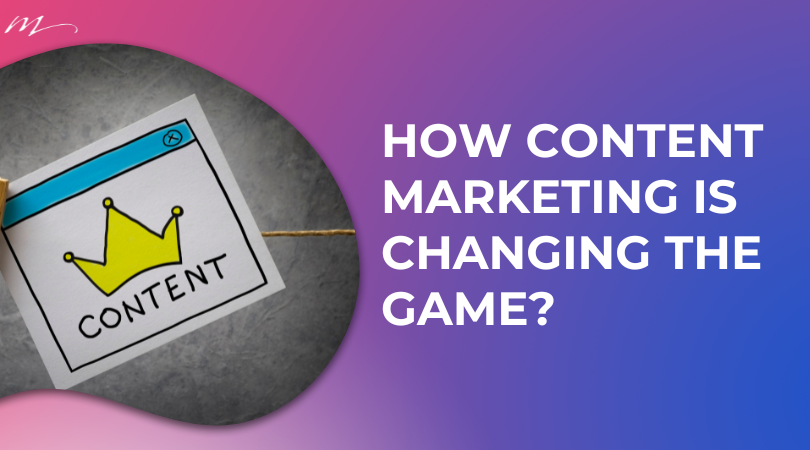Content marketing has become a game-changer for businesses across various industries. This article explores how content marketing is changing the game and revolutionizing the way businesses connect with their customers.
Competition is increasing because of the ever-evolving consumer preferences. Brands are leveraging content marketing strategies to engage their target audience. That is why your brand desperately needs collaboration through content creation.
The Evolution of Content Marketing
Initially, it was limited to traditional advertising methods such as print media, television, and radio. Content marketing has taken on a whole new dimension.
This is because of increased public awareness, competition and advancement in IOT. It has shifted from interruptive and one-way communication to a more customer-centric and interactive approach.
The Future of Content Marketing
As technology continues to advance, content marketing will continue to evolve. The future of content marketing lies in personalized and immersive experiences. Brands will leverage emerging technologies such as:
- Virtual Reality (VR)
- Augmented Reality (AR)
- Artificial Intelligence (AI)
The focus will be on delivering hyper-relevant and interactive content that captivates the audience and drives meaningful connections.
Content Marketing Strategies
Creating Engaging and Valuable Content
This involves understanding the needs, challenges, and interests of the audience and developing content that addresses those aspects effectively. The best way to do so is finding content gaps in your top competitors.
By providing relevant and helpful information, brands can establish themselves as industry experts and build trust with their audience.
Embracing Different Content Formats
Content marketing is no longer limited to just written articles and blog posts, the game is changing. Brands are now embracing various content formats such as videos, infographics, podcasts, and interactive quizzes.
Moreover, Google even doesn’t promote such contents which are consistently coming in the same format. By diversifying content formats, businesses can cater to different audience preferences and capture their attention more effectively.
Leveraging User-Generated Content
User-generated content (UGC) has gained significant traction in recent years. It refers to any content created and shared by the audience themselves, such as reviews, testimonials, and social media posts.
By incorporating UGC into their content marketing strategies, brands can tap into the power of social proof and authenticity. Plus, foster a sense of community among their customers.
Building Strong Relationships with the Audience
Content marketing goes beyond just delivering information. It is about building meaningful relationships with the audience. Engage in two-way conversations, respond to comments and feedback, and personalize content.
This way, brands can connect with their audience on a deeper level. This fosters brand loyalty and encourages customers to become brand advocates.
Incorporating SEO Practices
Search engine optimization (SEO) plays a crucial role in content marketing success. Incorporate relevant keywords, optimize meta tags, and ensure proper formatting. Also, SEO practices are way broader than this.
Brands can improve their search engine rankings and drive organic traffic to their websites. Effective SEO practices help in increasing visibility and reaching a wider audience.
Utilizing Social Media Platforms
Social media platforms have become powerful tools for content marketing. Brands can leverage these platforms to share their content, engage with their audience, and amplify their brand message.
By utilizing social media analytics and insights, businesses can tailor their content to suit the preferences of their target audience and maximize their reach.
The Impact of Content Marketing

Increased Brand Awareness
Content marketing allows businesses to showcase their expertise and values to a wider audience. By consistently delivering valuable and relevant content, brands can increase their visibility and build strong brand awareness. This, in turn, leads to better recognition and recall among consumers.
Improved Customer Engagement
Engaging content is key to capturing and retaining the attention of customers. Content marketing enables businesses to create compelling narratives and experiences that resonate with their target audience.
By fostering emotional connections and interactive experiences, brands can enhance customer engagement and encourage them to take desired actions.
Enhanced Lead Generation
Content marketing serves as a powerful lead generation tool. By offering valuable content in exchange for contact information, brands can attract potential customers and nurture them through the sales funnel.
By providing informative and relevant content at each stage, businesses can build trust and credibility, ultimately converting leads into customers.
Building Customer Trust and Loyalty
Trust is the foundation of any successful business relationship. Content marketing is changing the game by allowing the brands to establish trust by providing helpful information to their audience.
By consistently delivering high-quality content that addresses the pain points of their customers, businesses can foster trust and loyalty, leading to long-term customer relationships.
Boosting Search Engine Rankings
Content that is optimized for search engines can significantly impact a brand’s visibility online. By incorporating SEO practices into their content marketing strategies, businesses can improve their search engine rankings and attract organic traffic. This increased visibility not only drives website traffic but also enhances the credibility and authority of the brand.
Conclusion
Content marketing has transformed the way businesses engage with their audience. By creating valuable, engaging, and targeted content, brands can build trust, drive customer engagement, and achieve their marketing goals.
As the digital landscape continues to evolve, content marketing will remain a vital strategy for businesses to succeed in the competitive market.
Frequently Asked Questions
How long does it take to see results from content marketing?
The timeline for seeing results from content marketing varies depending on various factors such as the industry, competition, and the quality of content. In general, it takes time to build an audience and establish credibility. However, with consistent and strategic content efforts, businesses can start seeing positive results within a few months.
Is content marketing suitable for all types of businesses?
Yes, content marketing can benefit businesses across various industries and sizes. Regardless of the nature of the business, content marketing allows brands to connect with their target audience, build brand awareness, and drive growth. The key is to understand the audience and tailor the content accordingly.
How often should I create new content?
The frequency of creating new content depends on your audience’s preferences, your industry, and available resources. Consistency is crucial in content marketing, so it’s recommended to develop a content calendar and stick to a regular posting schedule. Whether it’s weekly, bi-weekly, or monthly, the focus should be on delivering quality content rather than quantity.





